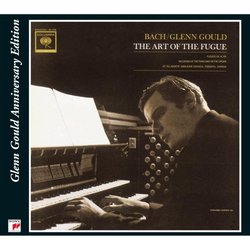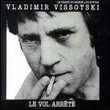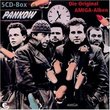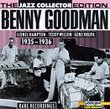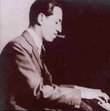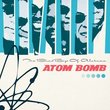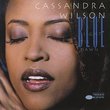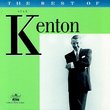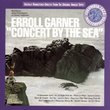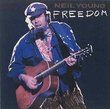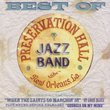| All Artists: Glenn Gould, Bach Title: Art of the Fugue - 70th Anniversary Edition Members Wishing: 1 Total Copies: 0 Label: Sony Release Date: 9/3/2002 Album Type: Limited Edition, Original recording remastered Genre: Classical Style: Symphonies Number of Discs: 1 SwapaCD Credits: 1 UPC: 696998775923 |
Search - Glenn Gould, Bach :: Art of the Fugue - 70th Anniversary Edition
CD DetailsSimilar CDsSimilarly Requested CDs
|
CD ReviewsThe Best Bach Interpreter of the Century Emil Khekoyan | L.A., CA, USA | 11/29/2003 (5 out of 5 stars) "I absolutely love all the works played by Glenn Gould. Why 3 stars then? For a long time I have loved every work that Gould brought to life and I still absolutely love them. However, "The Art of the Fugue" really made me see some of Glenn's dark side. The flaw is that his high speeds have absolutely no excuse on this marvelous piece of creation. It is true that Gould is the best pianist when it comes to playing Bach, but to understand what I mean, go and listen to Contrapunctus IV by some other performer who plays it much slower than Glenn. I personally recommend especially the trumpet version. It will blow your mind and convince you that Gould's performance of this piece was really hiding its magnificent beauty and drama. It is simply not possible to express something so breathtakingly dramatic by playing it staccato and also too fast. Have you ever seen someone who had a great loss crying by short stops and very fast? I don't suppose so. And the comparison is very fair because all the instruments, especially the piano, were created to resemble the human voice. `Art of the Fugue' is nothing like the Goldberg Variations where Gould's touch made the music beautiful, especially the first slow movement (which he actually plays very slowly and hence compensates for the staccato). It is much more dramatic and the performer's first goal must be to convey the drama to the listener. Who am I to judge Glenn? I just have had the privilege to listen closely to titans like S. Richter, E. Gilels, A. Rubinstein, A.Schnabel, S. Rachmaninoff, V. Horowitz, and many others. Not to mention that so far I have listened to the complete works of over 40 composers. Again, Glenn Gould plays beautifully, especially Bach's faster pieces, where even Emil Gilels and Sviatoslav Richter can't do such a precise and concise interpretation. But we must remember that Glenn is a great pianist, but a pianist that can't even match with the Genius of Johann Sebastian Bach (I have heard Glenn's compositions). It is ironic that listeners give so much credit to Gould that they absolutely forget that the only reason that he is able to play such beautiful pieces is because Bach has created them in the first place! With this in mind, we still can accept new ways of interpretation of Bach, BUT NOT TO THE POINT THAT IT DECREASES THE INTRINSIC VALUE OF BACH'S COMPOSITIONS. Glenn does not do this often, but it is shocking that he chose to show his over-interpretation on a work that is considered to be the most important one in the entire classical repertoire. If Glenn was made to play these pieces by his contractors then the flaws can be partially forgiven. It all comes down to this: this work should by no means put Gould's abilities in question, since he is indeed the best Bach interpreter of this century. However, one must not be blinded and be focused on any singular performer for the interpretation of all the pieces in the classical repertoire - Gould might outdo Horowitz in performing the `Emperor Concerto' (Beethoven) and Gilels in playing Bach's `French Suites', but when it comes to pieces like Beethoven's "The Tempest," his staccato is not in its right medium and becomes a cat's play compared to the powerful fingers of Richter. (I have heard over one hundred pieces by Gould and could barely notice his humming. Why? Because I hum with him! So please do not complain since a real classical listener should not even notice the humming. Imagine listening to someone talking and at the same time listening to Bach. As far as I am concerned, you shouldn't even be able to notice that that person even exists). EDIT: After some years (7 years!), I am amending my original rating - it is definitely worth five stars. Yes, perhaps this recoding comes as a little dry, but it is supposed to be on the piano - after all, it was written for the harpsichord, which is as dry as it gets. In addition, this piece is so moving that the listener can often forget that this is not from the Romantic era. After years of listening to this piece, Gould's recording is the only one that I keep going back to - I just can't get tired of it. If you'd like a more "romantic" approach to this piece (which is unlikely to be in Bach's style), you can try other pianists (I don't have any favorites other than Gould), or better yet, you can check out this piece on other instruments, such as the version for string quartet by Emerson Quarter or the orchestral version by Karl Munchinger. This is not to say that Gould's performance is not moving, but he takes the more lively approach to this piece EXCEPT, except in the mellifluous last (unifinshed) Contrapunctus 18: Fuga A 3 Soggetti. Gould caresses that piece so gently and dramatically on the piano that no other can match him on a keyboard. That alone deserves five stars." Worth getting for Contrapunctus XIV, but for full performanc Dr. Gershom Martin | Rechovot Israel | 08/06/2005 (3 out of 5 stars) "This is a partial performance on organ paired with a partial performance on piano. I didn't care too much for the organ (although Gould's very "un-organistic" articulation does work with these pieces, I miss the unique expression of his piano playing). Some of the piano recordings sound like somebody surreptitiously taped them on a concealed tape recorder. If you want a complete Art of Fugue on piano that's as close to Gould as it gets, go with Tatiana Nikolayeva's stellar 2 CD-recording on Hyperion (CDA66631/2). I have 9 AoF performances in my collection (piano, organ, string quartet, Hermann Scherchen's orchestral arrangement), and Nikolayeva's set is my favorite by far. (It also includes the two Ricercars from The Musical Offering BWV1079 and the four Duets BWV 802-805, originally for organ.) However, if you're as much of a Bach nut as I am, the Gould CD is worth getting just for Gould's incredible performance of Contrapunctus XIV (the final unfinished fugue)." Gould gold Arthur Toomey | Uk | 12/07/2002 (5 out of 5 stars) "I must admit hearing Gould's staccatto playing of the organ first left me cold; but on the second hearing, the clarity of counterpoint came vividly to life. The piano fugues are all very moving albeit occasionally eccentric. The inclusion of BWV 898, a rarity, very doubtful and very Beethovenian is an additional pleasure. Whoever wrote it, it is an excellent piece of music."
|

